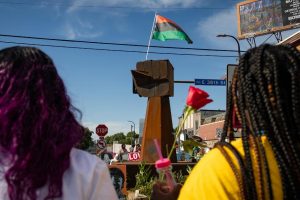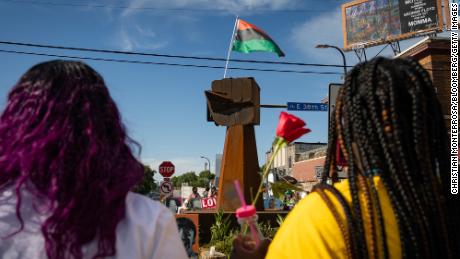What is Juneteenth?

Lisa Osborne Ross is the US CEO of Edelman. The opinions expressed in this commentary are her own.
During a recent visit to Minneapolis, a colleague and I stopped by Cup Foods, the convenience store that served as the backdrop of George Floyd’s murder. It was disheartening to see that, despite our national reckoning on racial justice, not much has changed over the past two years and, in a lot of ways, the surrounding streets looked exactly the same.
While we have since added Juneteenth (also known as Emancipation Day) to the list of federal holidays, it hasn’t helped address the stark social and economic inequities facing Black Americans in 2022. It hasn’t eradicated food deserts. It hasn’t prevented people from being gunned down. It hasn’t secured voting rights. It hasn’t made Black students feel more empowered in the classroom. It hasn’t gotten more Black people positioned in the boardroom.
It also still hasn’t yielded a clear operating playbook for Corporate America on how companies can use their platform to help us achieve a more equitable world. Unfortunately, the principles of representative branding and inclusive communications still are not as intuitive as we may think. And as US CEO of a global communications firm — and a proud Black woman — I see the missteps daily and firsthand in my work with Fortune 500 companies. I also see the opportunity.
As Pan-African flags begin to come out for the upcoming holiday, critiques of brands’ celebratory Juneteenth marketing campaigns are already emerging, underscoring the fact that many brands continue to struggle with how to play authentically in this space. To be clear, everyone is on their own personal and professional journey to get this right, and there is considerable nuance involved in every step. But there are a few best practices companies and CEOs can rely on as they chart their path forward this June:
First, stop reducing people of color to a day or month. June 19th isn’t an opportunity to sell; it should be an opportunity to solve. If you want to engage Black consumers, employees and community members, your company must deploy an authentic, always-on strategy focused on making real impact. So many companies have professed allyship with George Floyd’s family and community — but how many have invested substantial financial resources in Minneapolis? In addition to financial investment, consumers notice when your public affairs work lines up with your values to create policy change. Our client Dove did just that with its “Hair Love” campaign, an initiative that raised awareness and drove tangible legislative change against race-based hair discrimination via the Crown Act.
Second, listen to Black people. It may sound simple, but do you know what your Black buyers actually want and need? I don’t think many of us asked for Juneteenth-branded products. And we definitely didn’t ask for more White people wearing Kente cloth. While I can’t speak for every Black person, I didn’t even want a federal holiday. We want access to good-paying jobs with upward mobility. We want criminal justice reform, affordable housing and access to quality education for our children. We want the same things that White people want, but it’s up to companies to ask the right questions of their consumers and be open to honest feedback. For starters, ensure people of color are visible and vocal at every stage of your company’s decision-making process. If your boardrooms are all White, your strategy probably won’t reach or resonate with people of color.
Third, language matters. Stop calling us “minorities.” In fact, non-White people are emerging as the majority in the US Census, so the term “emerging majority” is a good place to start. And to my Black brothers and sisters, this goes for you, too. You also need to stop calling yourselves “minorities” and accepting any designation as “less than.” Remember that Black identity is multi-faceted and intersectional, and that not all of us are African Americans. Remember that language has the power to make people feel seen and heard.
Finally, and I realize I may be preachy here, but make sure your own life is diversified and represents the values you want your company to stand for. As a White marketer, you can’t possibly understand your Black consumer if you live, worship, socialize and send your kids to school in a homogeneous bubble. Practice what you preach at work and at home. You may elevate racial justice organizations from the corporate Twitter account, but would you put their bumper sticker on the back of your own car? Would you put their yard sign in front of your own home? You may have started initiatives to hire and elevate talent of color, but would any Black people be invited to the dinner party at your house on Saturday night? Expand your own social circles, and you’ll expand your mind.
To be clear, I — like most Black people I know — understand that branding missteps aren’t usually borne of ill-intent or malice. But I also — like most Black people I know — have felt the real pain of careless attempts at solidarity, which often have the effect of making us feel even more isolated. Marketing is at its best when it builds community, offers a new perspective, invites us to think differently — and of course, makes a profit in the process. To do so, companies must remember: Juneteenth is simply another opportunity to strengthen your year-round efforts to amplify Black voices, educate audiences, build dialogue, and make change — not another reason to put tone-deaf branding on your latest product.
Correction: A previous version of this story misspelled the name of the store that served as the backdrop of George Floyd’s murder.
Source: Read Full Article


